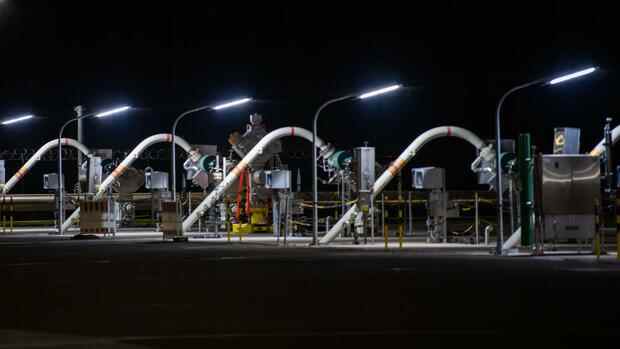The payment in rubles demanded by Russia has no practical consequences for Europe’s gas importers. Only on Friday morning did German energy companies have details of Russian President Vladimir Putin’s controversial decision to insist on paying for gas supplies in rubles from April 1st. Putin had threatened to stop delivery if the new regulation was not observed.
According to unanimous information from the industry, Russia is still fulfilling all contractual delivery obligations. Despite the war, transit through the Ukraine is also proceeding unhindered. The Gazprom group announced that on Saturday it would pump 108 billion cubic meters of natural gas through the neighboring country’s pipeline system to Europe. The Ukrainian state gas network operator confirmed Gazprom’s information. The value of 108 billion cubic meters corresponds approximately to the daily maximum amount promised by Ukraine for the transit of Russian gas.
Although the gas continues to flow, the situation remains unclear. In industry circles it was said that the moment of truth was yet to come and that the situation remained legally and politically precarious. A decision as to whether and how the payments for Russian gas and oil can now continue will only be made in close consultation with the federal government.
Similar information came from other European countries. “We have received the message from Gazprom and are analyzing it,” said Eni, Italy’s largest gas supplier. The company said it would not make any further comments. Alfred Stern, head of the Austrian energy company OMV, said that contact was made with Gazprom in order to be able to interpret Putin’s decree: “We have now received written information from Gazprom, which we are now analyzing,” he said.
Top jobs of the day
Find the best jobs now and
be notified by email.
The federal government had emphasized that it rejected the ruble payment. The G7 energy ministers, chaired by Federal Economics Minister Robert Habeck (Greens), decided last Monday not to accept Putin’s demand.
The G7 energy ministers met virtually on Monday.
(Photo: dpa)
The fact that the situation is still relaxed at the moment also has to do with the payment modalities. Industry insiders explain that in many cases payments for deliveries made by the end of March will not be due until mid-April. “The showdown is yet to come,” it said.
However, signals came from Russia that insiders took as a sign of relaxation. Through its Telegram channel, the Gazprom Group declared that as a Russian company it was “unconditionally and fully subject to Russian law”. However, one is a “responsible partner” and will continue to “export the gas safely to customers”.
So far, Putin’s decree has been interpreted in the industry as meaning that foreign gas customers must open two accounts with Russia’s Gazprombank: a ruble account and a foreign currency account. The gas is paid for by transfer to the foreign currency account. The bank then sells this currency on the Moscow Stock Exchange and credits the received rubles to the ruble account, from which the outstanding amount is transferred to Gazprom in rubles. This mechanism applies only to Russian gas delivered through pipelines, not to Russian Liquefied Natural Gas (LNG).
The purpose of this operation is disputed among Russia experts. Like all Russian exporters, Gazprom has been forced to exchange 80 percent of its export earnings for rubles since a decree issued by Putin after the start of the war on February 24. For Moscow, switching to ruble payments can only bring additional benefits if an unfavorable exchange rate is chosen, said a person familiar with the matter. The aim should therefore be to stabilize the exchange rate of the Russian national currency through high demand.
OMV boss: “The exit from Russian gas has its price”
Putin’s blatant threat to cut off gas supplies if his decree is ignored has raised concerns in many European countries. OMV boss Stern said that doing without Russian gas is currently impossible. “Unless we are ready to live with massive consequences,” said the manager of the newspaper “Die Presse”.
“We’re in a difficult position that we can’t just step out of Russian gas,” Stern said. As a landlocked country, Austria has no access to liquid gas. Any diversification would mean investing more in expensive infrastructure to get access to more expensive gas. “The Russian gas phase-out comes at a price. That has to be clear to us,” says Stern.
Looking back at OMV’s high investments in Russia, Stern said that country risk was underestimated. “The billions that flowed to Russia were a bad investment. We misjudged the risk there.”
More: Gazprom gives up its German subsidiary Gazprom Germania.
